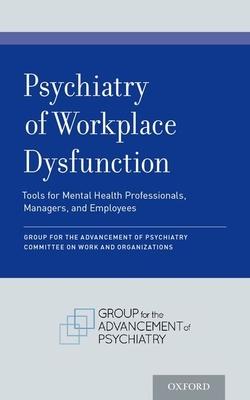Work is essential to healthy and adaptive human psychological functioning. The work ethic couples work and reward in order to endow work with meaning, and a healthy workplace supports relationships and behaviors that promote a strong work ethic and cohesive group function, therefore both accomplishing the overall goals of the workplace and enhancing the mental health of individual workers. Research has shown that attending to workplace relationships and engaging employees increases productivity, creativity, and loyalty, yielding both short-term and long-term benefits. Disruptions of these relationships can lead to significant impairment in performance and deterioration in workers’ mental health. However, the tools that managers once relied upon to restore relationships have been weakened-in part because of technology, globalization, and litigation.
Psychiatry of Workplace Dysfunction describes key drivers that disrupt the workplace environment and provides strategies and tools to address problematic behaviors and emotions that place the mental health of employees at risk and reduce the effectiveness of the organization. The principles discussed in this book are designed to foster high-functioning workplace relationships, and the authors’ psychiatric training, coupled with the breadth of their collective years of business and legal consultation experience, offers unique wisdom about developing and sustaining a relationship-focused perspective at work. These insights integrate cutting-edge information with existing research and understanding of the psychological dynamics of the workplace-all clearly presented to speak to an audience of mental health professionals, managers, and employees alike.
| FindBook |
|
有 1 項符合
Grieff的圖書 |
 |
$ 2759 | Psychiatry of Workplace Dysfunction: Tools for Mental Health Professionals, Managers, and Employees
作者:Andrew O.,Barrie,Brian,Brown,Christopher T.,Josh,M.D.,M.D./ Flinton,M.D./ Gibson,M.D./ Grant,M.D./Grieff 出版社:Oxford Univ Pr 出版日期:2017-12-19 語言:英文 規格:平裝 / 12.1 x 19.7 x 1.3 cm / 普通級  看圖書介紹 看圖書介紹
|
|
|
圖書介紹 - 資料來源:博客來 評分:
圖書名稱:Psychiatry of Workplace Dysfunction: Tools for Mental Health Professionals, Managers, and Employees
|






![塔木德:猶太人的致富聖經[修訂版]:1000多年來帶領猶太人快速累積財富的神祕經典 塔木德:猶太人的致富聖經[修訂版]:1000多年來帶領猶太人快速累積財富的神祕經典](https://media.taaze.tw/showLargeImage.html?sc=11100697818)




